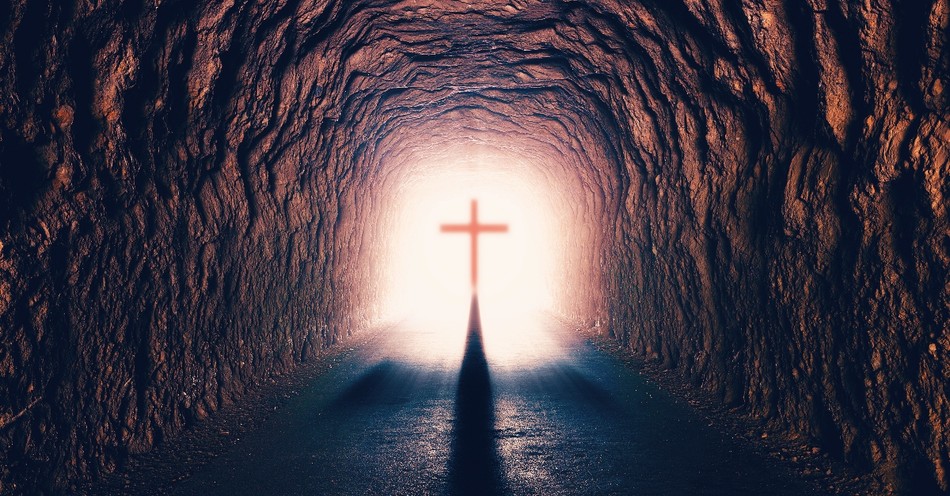Easter symbols, common to the Western world, include eggs and bunnies. Chicks and flowers represent the new life of spring. At Easter, Christians ponder two symbols more than any others: the empty tomb and the cross. Why these, and why is the cross more symbolic than the empty tomb?
What Is a Symbol?
The dictionary describes a symbol as “something used for or regarded as representing something else; a material object representing something, often something immaterial; emblem, token, or sign.” Imagery in literature and visual art can sometimes be the product of an inside joke or a personal association — something the writer or artist and his closest friends would recognize.
A symbol, however, means something to a much wider audience. The dove has become a sign of peace in Christian communities and elsewhere. A lamb represents Jesus as the spotless sacrifice. A fish reminds us of the miracles of Christ and nourishment of the soul for those who are in Christ. Symbols are representative of a theme, a person, or an event: the empty tomb and the cross stand for all three.
The Empty Tomb
When Christ rose from the grave, He defeated sin and death. This was the most amazing miracle of all time. Being revived on the gurney after one’s heart has stopped beating for a few minutes is nothing like meeting a friend who was cold and dead, His whole body torn apart and laid in a tomb covered by a heavy stone.
Christ’s resurrection celebrated on Easter Sunday, not only points to the hope we have in Jesus that our sins have died along with our old selves, but that we are reborn in Christ and will be raised to Heaven with Him.
Christ’s victory over the grave was victory for all Christians. Romans 6:4 explains it this way: “We were therefore buried with him through baptism into death in order that, just as Christ was raised from the dead through the glory of the Father, we too may live a new life.”
The empty tomb reminds us not to stay locked in guilt, grief, and shame over the crucifixion. The resurrected Jesus, absent from the tomb, distinguishes the Christian church from other religions or pseudo-Christian beliefs in which Christ was a good man but not God; a man who dies — period.
The Symbol of the Cross
A plain wooden cross represents the sacrificial and substitutionary death of Jesus. This symbol prompts questions about who He was, who He is, how He died and why. It is not only atheists and those who practice other religions, but many Christians prefer not to think about the nature of Jesus’ death. Without considering His suffering, however, one might believe Christ does not understand ours, no matter what that suffering is: intense physical pain, abandonment, or humiliation.
One must consider the cross to appreciate what it cost the Father to give us freedom from sin so that we could be reunited with Him, and how loathsome our sin is. One cannot truly recognize the significance of the empty tomb or the futility of works-based religiosity without some understanding of what the Messiah went through for our sakes.
When one realizes that He chose to endure so much suffering, Christ’s deep love for us becomes very, very personal. That Jesus conquered the grave is all the more victorious in light of the complete brokenness of His body.
The cross evokes emotion, starts arguments and has been controversial across cultures since it became the most poignant symbol of sacrifice and love for Christians. We react to it: to the brutality of the crucifixion. Why would God allow His Son to die, and why in such a gruesome manner? If He is so powerful, why not destroy His enemies instead of being destroyed?
Many individuals identify as “Christian” yet believe Jesus was merely a nice guy offering earthly wisdom and the cross makes no sense, even though history tells us that Christ died there. We grapple with the evidence.
Could a dishonest man or a lunatic go to such a death offering forgiveness of sins, thereby equating Himself with God, and still be a good man? Given the fact Christ was imprisoned, beaten, and flogged before the nails were driven in, one might imagine any facade or lunacy would have given way to truth or sanity if He wasn’t the Messiah.
Submission at the Cross
To unbelievers, the lyrics of “The Wondrous Cross” by Isaac Watts are meaningless: “When I survey the wondrous cross on which the Prince of Glory died, my richest gain I count but loss and pour contempt on all my pride.” Our faith is not about us; we were made to worship the Father.
Christ demonstrated submission to the Father by drinking from the cup God gave Him. “And being found in appearance as a man, he humbled himself by becoming obedient to death — even death on a cross!” (Philippians 2:8). When a person overlooks Calvary, this robs the celebration of its depth and its value. Overlooking Jesus’ crucifixion encourages a person to think that Christianity is about us and not about God.
At the cross “Jesus humbled himself in obedience” to the Father. He made the choice to do so “for people who had lost their way” so they would not be separated from God. He made peace between us and God once and for all: “the cross is final.”
Paul writes. “May I never boast except in the cross of our Lord Jesus Christ, through which the world has been crucified to me, and I to the world” (Galatians 6:14). “All Christians are sinners and do not deserve anything but judgment” yet we are blessed with the guarantee that we will never have to be rejected by the Father as punishment for our sins. No amount of charitable giving, volunteer work, or sincere religious observance will “be sufficient to make me acceptable at the judgment.” The only chance I have is “the love of Christ at the cross.”
Celebration and Praise
The grave has been robbed of its prize, and cause for celebration at Easter and every day, but a Christian cannot skip the bloody details of Calvary. Billy Graham wrote “in the cross we see the clearest evidence of the world’s guilt. At the cross of Christ, sin reached its climax.”
Sin, peace, mercy, kindness, and love; humility and service: one symbol represents all of these. The cross reminds us why Christ came and why He needed to die. He did not live to save Israel from the Roman Empire; the enemy was sin and Christ died to pay for the sin of all who would believe for all time.
“The radical message of the cross transformed Saul of Tarsus and changed him from a persecutor of Christians to a tender believer and an apostle of the faith.” The empty tomb is a powerful reminder that we worship a living God who saves and sanctifies. Through the cross, however, we are granted the freedom symbolized therein, but we are not merely free to celebrate in worship of the Living God: we must rejoice and sing praises because of the cross.
©iStock/Getty Images Plus/carloscastilla




.jpg)